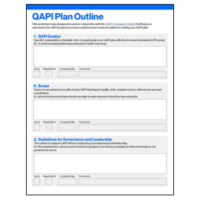Infection control is a critical aspect of healthcare that aims to prevent the spread of infections in healthcare settings. Quality Assurance Performance Improvement (QAPI) programs are essential for ensuring that infection control measures are effective and efficient. By implementing a robust QAPI program for infection control, healthcare facilities can enhance patient safety and prevent healthcare-associated infections.
One sample QAPI for infection control involves conducting regular audits and assessments of infection control practices within the healthcare facility. This may include reviewing hand hygiene compliance, monitoring the use of personal protective equipment, and evaluating the cleanliness of patient rooms and equipment. By regularly assessing infection control practices, healthcare facilities can identify areas for improvement and implement targeted interventions to reduce the risk of infections.
Another key component of a QAPI program for infection control is the implementation of evidence-based best practices. Healthcare facilities should stay up-to-date on the latest guidelines and recommendations for infection control, such as those issued by the Centers for Disease Control and Prevention (CDC) and the World Health Organization (WHO). By following evidence-based best practices, healthcare facilities can ensure that their infection control measures are effective in preventing the spread of infections.
Furthermore, communication and collaboration among healthcare staff are essential for successful infection control. Healthcare facilities should encourage open communication and feedback among staff members regarding infection control practices. By fostering a culture of transparency and accountability, healthcare facilities can ensure that all staff members are actively engaged in infection control efforts and are committed to upholding best practices.
Regular education and training for healthcare staff are also crucial components of a QAPI program for infection control. Healthcare facilities should provide ongoing education and training on infection control practices, including proper hand hygiene techniques, the use of personal protective equipment, and the management of infectious diseases. By equipping staff with the knowledge and skills they need to prevent infections, healthcare facilities can enhance the overall effectiveness of their infection control measures.
In conclusion, implementing a comprehensive QAPI program for infection control is essential for ensuring patient safety and preventing healthcare-associated infections. By conducting regular audits, following evidence-based best practices, promoting communication and collaboration, and providing ongoing education and training, healthcare facilities can enhance their infection control efforts and reduce the risk of infections. By prioritizing infection control through a QAPI program, healthcare facilities can create a safer and healthier environment for patients and staff alike.
